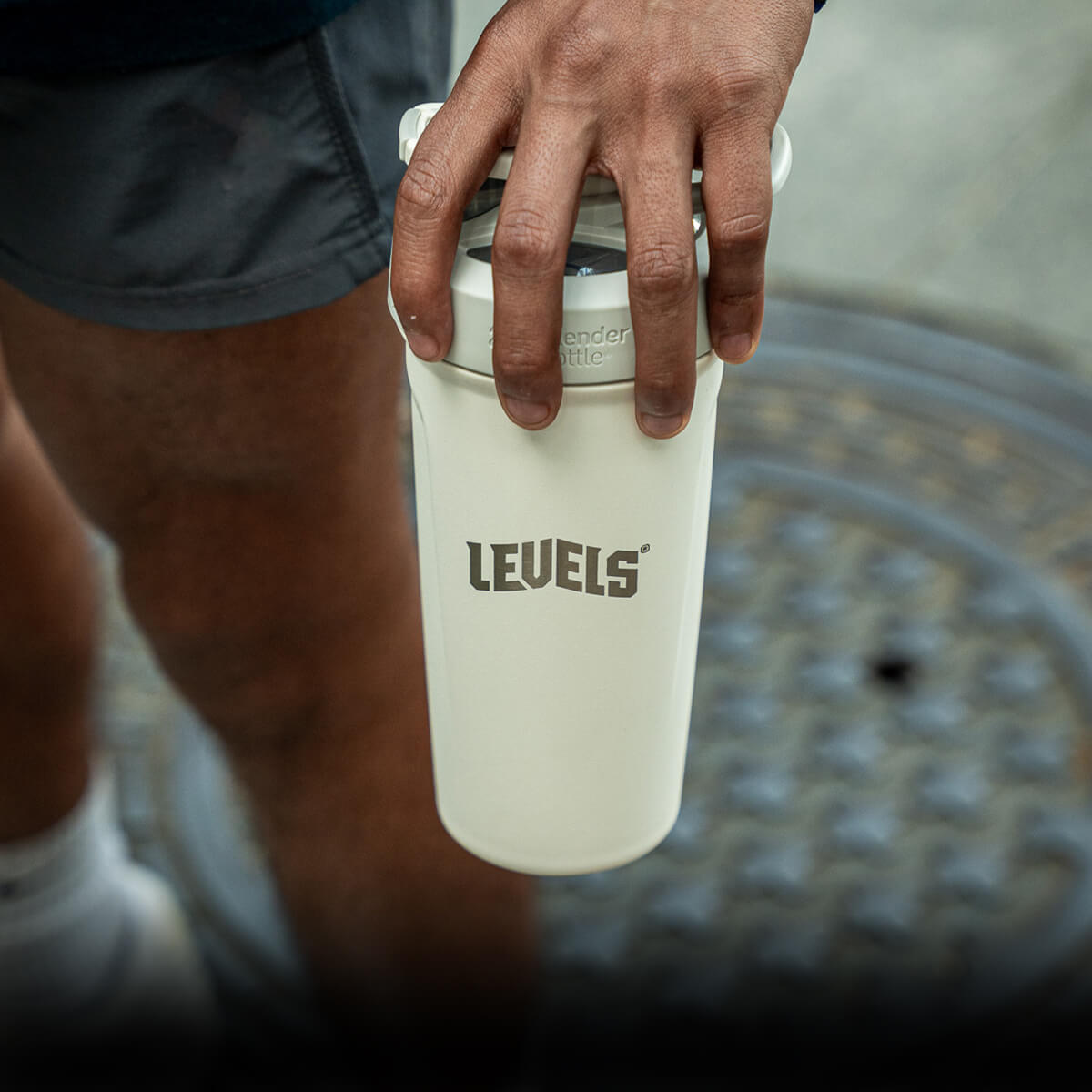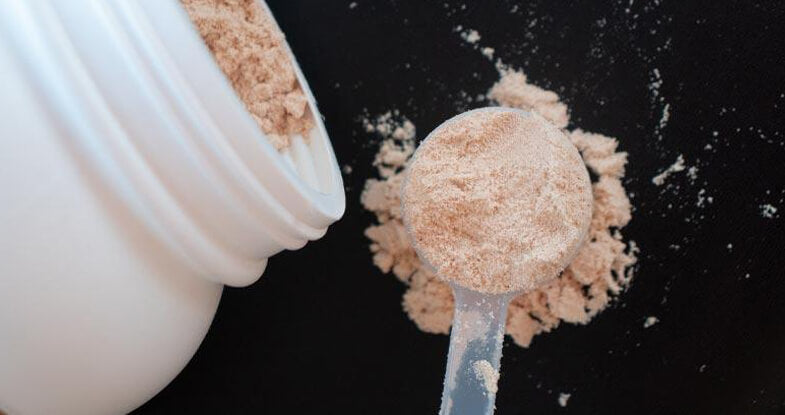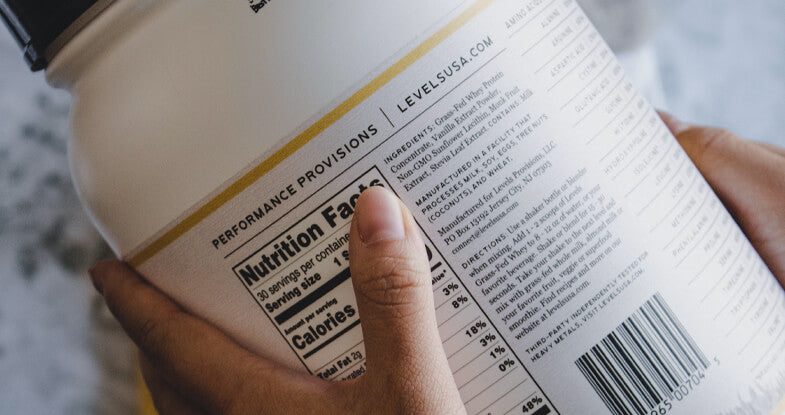Branched-chain amino acids (BCAAs) are essential amino acids. They’re necessary for building muscle and recovering from exercise.
And unlike some aminos, you must obtain BCAAs from the food you eat--your body cannot make them by itself.
Additionally, athletes and fitness enthusiasts have higher requirements for BCAAs and dietary protein[*].
Keep reading to discover what branched-chain amino acids are, 5 reasons you might want to take them, and the best times to take BCAAs according to science.
What are Branched-Chain Amino Acids (BCAAs)?
The three branched-chain amino acids (BCAAs) are leucine, isoleucine, and valine. They get their name because they have a nonlinear or “branched” configuration.
In simple terms, BCAAs have a branch shape at the molecular level.
Amino acids are the building blocks that make up protein, including protein in the foods you eat as well as the muscles in your body.
BCAAs belong to a group of aminos called essential amino acids, meaning your body can’t make them. As a result, you must obtain BCAAs and other essential amino acids from food or supplements.
Meat, fish, eggs, and dairy products are the main dietary sources of BCAAs[*]. Whey protein powder is also BCAA-rich, containing around 20% branched-chain amino acids by weight[*].
And along with dietary protein or protein powder, supplements are another way to increase your BCAA intake.
Commercial BCAA supplements usually contain either a 2:1:1 or 4:1:1 ratio of leucine, isoleucine, and valine.
People mix powdered BCAAs with water, similar to protein supplements. Typical doses range from 10 to 20 grams of BCAA powder per day.
Next, we’ll discuss why BCAAs are popular with athletes and health enthusiasts alike.
Subscribe to get the latest advice, sales, discounts, product drops and more. Join now and get 15% off your first order.
5 Fitness & Health Benefits of BCCAs
1. Promote Muscle Growth
When taken around exercise, BCAAs, particularly leucine, stimulate muscle protein synthesis (the scientific name for muscle growth)[*][*].
BCAAs also inhibit muscle protein breakdown, which is the opposite of muscle protein synthesis[*][*].
By increasing muscle growth and reducing the loss of muscle mass, BCAAs may increase the amount of muscle mass you gain from resistance training.
2. Speed Recovery Time
According to studies, branched-chain amino acids can decrease muscle damage from exercise[*][*].
As a result, taking BCAAs may speed up recovery time between exercise sessions.
And a 2018 study from the Journal of Nutrition revealed that supplementing with BCAAs is an effective strategy for endurance athletes to deal with elevated protein needs after exercise[*].
3. Decrease Muscular Soreness
Studies show that people who take BCAAs experience less soreness after exercises like squats and drop jumps[*][*]
One cause of delayed onset muscle soreness (DOMS) after lifting weights is tiny “microtears” in muscles[*].
Therefore, it’s not entirely surprising that BCAAs may decrease muscular soreness by reducing muscle damage during exercise.
4. Reduce Exercise Fatigue
Several human trials show BCAAs reduce fatigue during and after intense exercise[*].
Evidence suggests that when you exercise, serotonin production in your brain contributes to feelings of fatigue[*][*].
The effects of BCAAs on fatigue may occur due to decreased transport of the amino acid tryptophan (which your body uses to make serotonin) into the brain, thus temporarily lowering serotonin levels[*].
5. Help Prevent Muscle Loss
The ability of branched-chain amino acids to prevent muscle breakdown is also relevant for people who aren’t athletes or fitness enthusiasts.
Research shows that BCAAs may be useful for preventing muscle loss associated with aging, as well as in conditions such as cancer[*][*]
When Is the Best Time to Take BCAAs?
As with many health and fitness questions, there’s not a single, universal answer regarding BCAA timing.

Fortunately, however, there is enough scientific research to provide a clear picture of how your body responds to BCAAs in various contexts. From studies, we can derive insight on how to best use them--around exercise, with other supplements, and on rest days, for instance.
In this section, we’ll go over different scenarios and timing-related questions.
Branched-Chain Amino Acids Before, During, or After Exercise
Some evidence indicates that taking BCAAs before exercise may work better than taking them post-workout.
For example, a study of young men found that 10 grams of BCAAs before exercise was more effective at decreasing muscle soreness and muscle damage compared to taking the amino acids after exercise[*].
Is There a “Window of Time” for BCAAs?
When you take BCAAs orally, they reach their highest levels in your bloodstream approximately 30 minutes after ingestion[*].
On the other hand, the idea of an “anabolic window” around exercise for protein or amino acids isn’t a subject of agreement among studies[*]. However, future research may provide better answers.
Although there is no definitive scientific answer on whether there is a “window of time” to take BCAAs, at Levels, we recommend people who take BCAA powder use it pre-workout.
Timing your BCAA supplement pre-workout is just as convenient as any other time, and the increased blood flow to muscles during training may help your results from supplementation.
Taking BCAAs with Carbohydrates or Whey Protein
Your body uses the anabolic hormone insulin to transport BCAAs inside cells[*].
No one knows for sure, but taking your BCAAs together with carbs could potentially work better by raising insulin levels.
Also, one study found that a combination of BCAA and carbohydrates during weight training reduced cortisol levels more compared to BCAA alone[*].
At the very least, if you’re already taking pre-workout carbs and BCAAs, timing them together makes good sense.
Whey protein also elevates insulin levels, which means it may enhance the cellular transport of BCAA supplements[*]. Therefore, if you’re on a low-carb diet, you could experiment by pairing BCAAs with whey protein rather than carbs.
However, keep in mind a 30 gram serving of whey protein provides up to 6 grams of BCAAs[*]. That means the more whey protein powder you consume, the less likely you are to need supplemental BCAAs.
Finally, keep in mind that whey protein is a complete protein that provides all the amino acids your body requires, while BCAAs are not. Therefore, you can’t use BCAAs in the place of complete proteins like whey.
Taking BCAAs on an Empty Stomach
If you lift weights or perform other intensive forms of exercise in a fasted state, timing branched-chain amino acids pre-workout may help prevent muscle protein breakdown[*].
BCAAs also absorb and reach their highest levels in your body faster than whey protein or other food sources, making them an ideal supplement for decreasing muscle loss if you’re training on an empty stomach[*].
Taking BCAAs on Rest Days
For best results, you should use branched-chain amino acids every day, not just on training days[*].
Also, BCAAs may work better taken in two divided doses each day, particularly on rest days[*].
You can take them on an empty stomach or with food.
While there’s currently no definitive scientific answer, at Levels, we like to consume rest-day BCAAs about 10-15 minutes before protein-rich meals.
Leucine in BCAA supplements may enhance the anabolic effect of meals, and it could potentially absorb faster and exert more effects in the absence of additional competing amino acids from whole proteins[*].
How Long to Take BCAAs
Research shows that taking BCAAs regularly and long-term works better than taking them for short periods, or only on workout days[*].
And your results from BCAAs may improve after you have taken them for at least 10 days[*].
Therefore, if you want to gauge how well BCAAs work for you, make sure you take them consistently.
However, there is one caveat. At Levels, we recommend occasional time off from any supplement.
Not only is it wise from a risk-benefit perspective, but periodic time off may also help your results.
While there’s no significant risk associated with taking BCAAs, a few weeks off per year is a smart idea.
What is the Correct BCAA Dosage Per Day?
According to a 2017 systematic review in the journal Nutrients, 200 milligrams per kilogram of body weight per day is the optimal BCAA dosage for muscle growth, performance, and recovery[*].
In other words, a 50-kilogram adult would take 10 grams of BCAAs per day, a 75-kg adult would take 15 grams, and a 100-kg adult would take 20 grams.
If you prefer pounds instead, plug in 91 milligrams of BCAAs per pound of bodyweight.
For example (approximate amounts):
- 9 grams of BCAAs for a 100-pound adult
- 11.5 grams for a 125-pound adult
- 13.5 grams for a 150-pound adult
- 16 grams for a 175-pound adult
- 18 grams for a 200-pound adult
- 20.5 grams for a 225-pound adult
Consider taking your entire daily BCAA dosage pre-workout with carbs on training days, and dividing it into two even doses before meals on rest days.
The Takeaway: BCAA Timing
Timing your branched-chain amino acids probably doesn’t make a huge difference, but it may be helpful, and certainly can’t hurt anything.
As we covered in this article, some research suggests that pre-workout is the best time for BCAAs if you’re exercising. Or if you aren’t training, take them in two divided doses on rest days.
Also, taking enough BCAAs and taking them for a long enough duration is likely more essential than timing.
So if you want to try them, make sure you start with 200 milligrams of BCAAs per kilogram of body weight (91 mg per pound of body weight) daily, and take them for extended periods longer than 10 days.
Overall, branched-chain amino acids are inexpensive and cost-effective, but if you already take whey protein daily, you may not need BCAA supplements--or could potentially benefit with lower doses.
Nonetheless, experimenting to figure out what works best for your body is always a fantastic idea.
You might discover that BCAAs enhance your weight-training results, speed recovery, make you less sore, and reduce fatigue.














